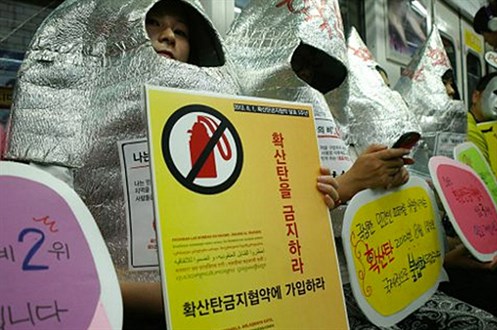01 August 2013
CMC Marks 3 Years of Success for the Convention on Cluster Munitions

CMC Campaigners from Weapon Zero draw attention to the issue of cluster munitions on the subway in Seoul. South Korea is a cluster munition producer. (c) Weapon Zero
(London 1 August 2013): Cluster Munition Coalition (CMC) members from around the world are today celebrating three years of the Convention on Cluster Munitions’ life-saving achievements and calling on countries who have not done so already, to join the global ban immediately.
Real world impact
Since the Convention on Cluster Munitions entered into force on 1 August 2010, no treaty member has used cluster munitions and significant progress has been made in preventing further tragedies through the destruction of hundreds of thousands of stockpiled cluster munitions containing tens of millions of submunitions, expanded clearance of contaminated land, and advances in victim assistance. (CMC’s annual publication Cluster Munition Monitor will be released on Wednesday 4 September with updated statistics on achievements under the Convention).
“Three years on, the Convention on Cluster Munitions is going strong with 112 States onboard and crucial progress has been made in cementing global support for the ban on this heinous weapon that kills and maims civilians indiscriminately, but there is still work to be done. Every state can and should join the Convention on Cluster Muntions,” said CMC Campaign Director, Sarah Blakemore.
Work to be done
Despite this progress cluster munitions are currently being used by the Syrian armed forces. CMC member Human Rights Watch has reported more than 156 cluster bomb attacks in at least 119 locations across Syria between October 2012 and March 2013, with ongoing use leading to mounting casualties, including women and children.
Use of decades-old Soviet Union produced weapons in Syria demonstrates the need for all countries worldwide to destroy their stockpiles and join the Convention on Cluster Munitions - renouncing this weapon will prevent future use and stigmatize cluster munitions for good. In response to Syria’s ongoing use of cluster munitions, one hundred and thirteen countries have spoken out against use in recent months.
Global campaign
Cluster bomb survivors and campaigners around the world will take action on 1 August to urge states to make progress on eradicating cluster bombs. Global actions include: a billboard campaign in Bosnia pushing for accelerated clearance of mines and cluster munitions; meetings with officials in Cambodia, a cluster munition affected country yet to join the treaty; a press conference in Democratic Republic of Congo, an affected country yet to ratify; campaigners in South Korea (a cluster munition producer) parading as cluster bombs on public transport; and campaigners in the United States together with US Senators calling for the country to join the Convention immediately.
The actions take place in the run up to the Fourth Meeting of States Parties to the Convention on Cluster Munitions, when over one hundred countries are expected to meet from 9 to 13 September 2013 to discuss universal adoption and implementation of the Convention, in Lusaka, Zambia. African countries have played a lead role in promoting the universal ban on cluster munitions and account for 42 of the 112 states that have joined the Convention to date.


